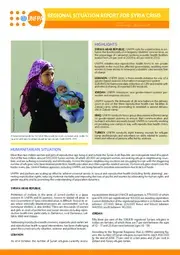SYRIAN ARAB REPUBLIC: UNFPA calls for urgent action to en¬hance the functionality of emergency obstetric care services, as the percentage of Caesarean sections in public health facilities soared from 29 per cent in 2009 to 45 per cent in 2013.
UNFPA initiates new reproductive health forms in ten private hospitals in the most five affected governorates, enabling more women to have access to emergency obstetric care services free of charge.
LEBANON: UNFPA pilots a three-month initiative for use of a gender-based violence information management system
(GBVIMS) to harmonize data collection on GBV and enable safe and ethical sharing of reported GBV incidents.
JORDAN: UNFPA introduces new gender-based violence pre-vention and response services.
UNFPA supports the deliveries of 24 new babies in the delivery room in one of the three reproductive health care facilities in Zataari camp, while proceeding to establish a second delivery site in Zataari camp.
IRAQ: UNFPA conducts focus group discussions in Domiz camp on gender-based violence to ensure that communication and outreach activities are needs based. UNFPA is currently working on providing new camps in Iraq with reproductive health clinics and services.
TURKEY: UNFPA conducts eight training courses for refugee camp professionals and volunteers on


